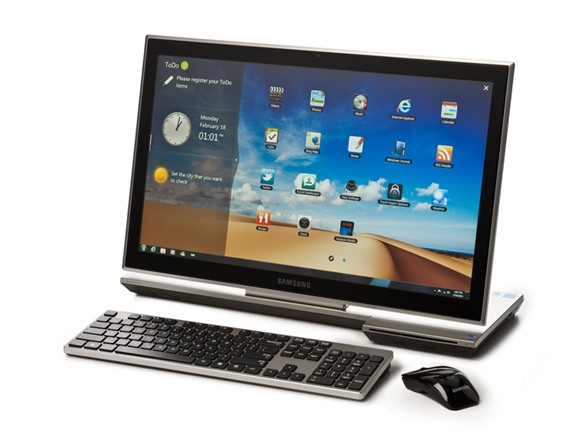 NEWS
NEWS
 NEWS
NEWS
 NEWS
NEWS
![]() Samsung could be about to shift away from its desktop PC business in light of falling demand caused by legions of consumers swapping them for mobile devices instead. The news comes from the Korea Times, which says that the move is a further signal that OEMs are entering a period of consolidation as they switch to specialize in either the manufacture of mobile devices or more traditional computing models.
Samsung could be about to shift away from its desktop PC business in light of falling demand caused by legions of consumers swapping them for mobile devices instead. The news comes from the Korea Times, which says that the move is a further signal that OEMs are entering a period of consolidation as they switch to specialize in either the manufacture of mobile devices or more traditional computing models.
Korea Times report quoted a Samsung official as saying that the firm was looking to focus its energies on developing more “popular” portable devices. The move would see Samsung divert resources to its research departments for handheld devices and so-called ‘hybrid’ laptops. The Korea Times further states that this development would fit in with a recent announcement by the South Korean government that the desktop PC business has been designated as an industry “suitable for smaller firms”.
But just hours after the report emerged, Samsung issued a statement to The Next Web describing the claims as “groundless”:
“The rumor that Samsung is withdrawing from the PC desktop business is groundless. Samsung will continue to offer diverse PC products according to consumer and market needs. “
It would be a surprise if Samsung did turn its back on the desktop PC business, in spite of the fact that most industry analysts agree that it’s fallen into sharp decline. IDC recently revealed how Q1 shipments of PCs had fallen by almost a third compared to the year before, making it one of the worst ever quarterly performances for the PC market as a whole.
However, this trend doesn’t reflect Samsung’s own sales in this area, which have been surprisingly encouraging. Like the other Asian PC powerhouse Lenovo, Samsung has continued to enjoy significant growth in the sector. During the first quarter, Samsung was the only major PC manufacturer to record double-digit growth on a percentage basis, an achievement that was no doubt helped by its recent push to develop Google Chromebooks.
Nevertheless, there’s no denying that now would be a good time to get out of the PC business if Samsung decides there’s no real future in it. IDC isn’t alone in its doomsday prophecies – recently, Mary Meeker released her 2013 Internet Trends Report, which estimates that shipments of tablet computers will likely surpass that of PCs in the next three years.
Of course, the PC isn’t going to go away any time soon – there’ll always be a need for ‘real’ computers, especially in the business world, but desktops themselves do appear to be vulnerable given how everyone likes to be mobile these days. What with today’s high-powered business laptops being every bit as good as the most heavy-duty desktop machine money can buy, there’s simply no real reason to purchase hardware that’s tied to a single location any more.
More likely, we’ll see laptops gradually establish themselves as the workhorse of choice for the enterprise, presuming Microsoft can satisfy critics of Windows 8 when its long-awaited ‘Windows Blue’ update finally arrives. And you can bet that there will be plenty of companies left over, eager to make an impression in this space. Already we’ve seen firm commitments from the likes of Lenovo and Acer, which recently launched the first 8-inch Window 8 tablet powered by Intel’s new “Haswell” chip, while Samsung itself made its own intentions clear with the launch of its Ativ One 5 Style PC that runs two operating systems – Android and Windows 9 – side by side.
Given how competitive the laptop market of the future is shaping up, it probably wouldn’t hurt to dump the desktop and focus on delivering a better mobile computing experience after all.
THANK YOU